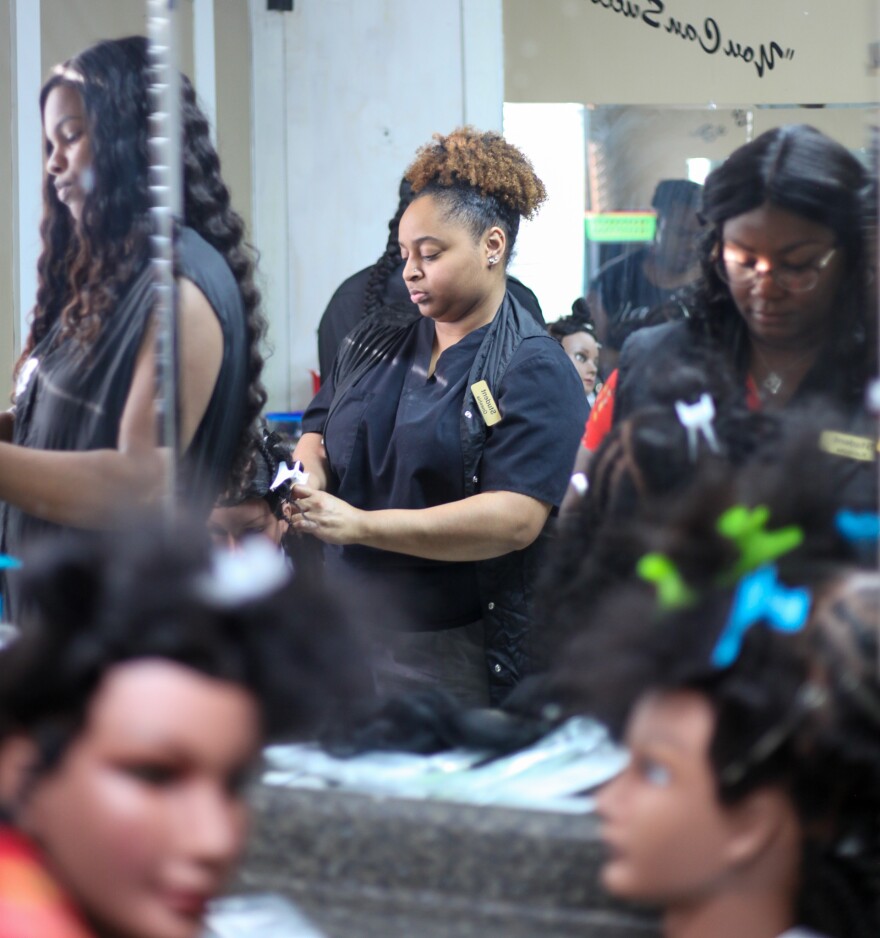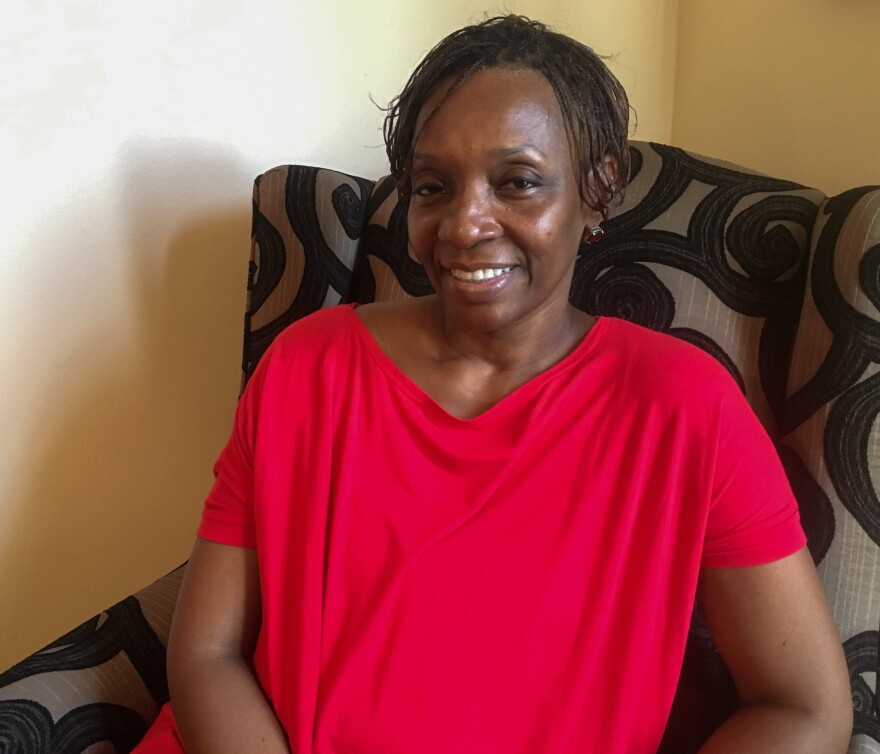As night school begins at The Institute for Braiding and Natural Hair in Cordova, instructor Tameshia Effinger reminds her small group of female students that tonight’s class is more formal than usual.
“There will be no music playing today, no talking,” she says as she directs them to have their plastic mannequin heads out, combed and ready.
Effinger's is proctoring a mock test, the practical portion of the state’s natural hair licensing exam. Students must prove proficiency in six distinct braiding techniques—from cornrows to box braids—under a certain amount of time.
That's just part of the accreditation. Also on the test: first aid for accidental scrapes or cuts, sanitation protocols and a written theory exam.
For students like 36-year-old Kanesha Pryor, the skills are important. But so is the license. She wants to open her own salon.

“It’s not just a piece of paper—it’s kind of like—I studied this, I mastered this,” she says.
But a new law that took effect last July means students like Pryor no longer require a license to own or work in a salon. They can opt to register as a hair braider with the state, which exempts them from the 300-hour training requirement to become a natural hairstylist. They just have to take a 16-hour sanitation course and post a sign that says they’re not licensed.
Natural hair styling refers to stylists who don’t cut, color or use other chemicals to alter a client’s hair. It’s a trade dominated by African American women that includes braiding, weaving and locking. All but one member of the 17-member Tennessee Black Caucus voted against the relaxed regulations, passed largely by Republican lawmakers, who said it removes constraints for braiding entrepreneurs.
Some say the legislation is working as intended, creating opportunities for those previously left out of the market. But others contend it’s undermining the integrity of the industry and minimizing consumer protections.
Effinger, who’s run her school in Cordova for a year-and-a-half, says watering down regulations for braiders erodes the professional standards and specialized knowledge that should be required of all natural hair stylists.
“Some people [don’t] know that low iron and vitamin D deficiency can cause your hair to fall out,” she says. “Some people don’t know that when you drop your comb on the floor, you’re not supposed to pick it backup and use it.”

Her students pay $1,500 for a 14-week course that covers everything from shampooing to disease control to marketing.
Patrick Ghant, 26, was the only male student in his class at a natural hair school in Bartlett. He walked away not only a skilled braider, but was exposed to the science of hair growth and best practices for communicating with a client.
His syllabus also included lessons on the historical cultural importance of natural hair styles for African Americans.
“A lot of people would actually hide food in their braids when they had to go over on a slave ship so that they could survive,” Ghant says. “Fast forwarding to now, just the pride in being able to wear your own natural hair and seeing that you can have a healthy head of hair without adding in a weave all the time.”
Salon owner Anya Parker, who has been braiding for 15 years, says cutting out training requirements exposes customers to poor service or hygiene risks such as scalp diseases.
Well-trained stylists, she adds, are practiced in preventing hair loss from over-tight braids, known as tension alopecia.
“People in our community actually make fun of it,” Parker says. “There’s a lot of women who are walking around that don’t have any hair around the outer edges of their hair.”
Tennessee Black Caucus member, Rep. Antonio Parkinson says the new regulations ignore safety concerns.

“The black community...they want the protections, and they want the oversight and they want the accountability...when it comes to their hair,” he says.
About half of all states do not have licensing requirements for hair braiders, which Stephanie Whitt, vice president of Beacon Impact, says ultimately benefits consumers by offering them more choices for service providers.
Beacon Impact is the lobbying group behind the hair braiding registration effort in Tennessee and part of the Beacon Center of Tennessee, a libertarian think tank seeking to limit occupational licensing.
"It’s not more dangerous to braid hair in Tennessee than it is in another state,” Whitt says. “What professionalizes an industry are the people who are working in that industry. It’s not the government’s role to professionalize an industry.”

So far, about 90 people have registered as hair braiders since the new law took effect—only a third of that number have opted for the complete natural hair styling license. (There are a total of 270 licensed stylists in the state).
Roxana Gumucio, executive director of the Tennessee State Board of Cosmetology & Barber Examiners says a hair braiding registration makes economic sense for people with little time.
Or even for those doing time: the sanitation class is being taught in some prisons as a way to help women monetize a skill.
“[Prison authorities] often see that braiding is a common thing that people would like to do or are already planning on doing and unlicensed," she says. "They are helping them complete the 16 hours of training while they are there [to get registered].”
For some, the braiding registration is a chance to start anew. Back in the 1990’s Debra Nutall opened a braiding salon in Memphis when trends in natural hair styling for African American women were first becoming en vogue.

At the time, Tennessee required her to have a cosmetology license to operate, which she considered to be expensive and unnecessary. She says the cosmetology curriculum wasn’t applicable to her services.
“We don’t want to do chemicals, we don’t want to do perms. Why would I be in a salon doing a perm when I am supposed to be braider?” the 57-year-old says.
Nutall eventually moved her salon to North Mississippi where licensing is not required.
Now, with the changed Tennessee law, she plans to reopen in Memphis, calling it D. Nutall’s - New Generation.
“Just give us a fair chance, and let us do what we do and then see the results of it,” she says.
This story was updated October 25 to include the total number of licensed natural hair stylists in Tennessee.


